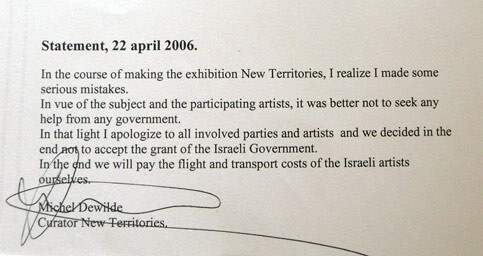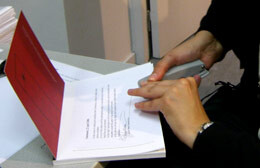The Electronic Intifada 21 March 2007

Michel Dewilde’s signed statement (Alexandra Handal)
In February 2006, I received an invitation from curator Michel Dewilde to participate in a show titled New Territories that he stated would be organized by “the City of Bruges with the support of the Flemish Community” and would take place at the DeHallen Belfort, in Brugges, Belgium. In the letter of invitation he explained the brief concept as well as the inspiration of the show by stating, “The project started with the critical views on the Israeli Wall and the occupation of Palestine but goes, in the end beyond this situation,” expanding the issues of territories globally and giving examples of other countries where walls have been erected or are in the process of being built. He also sent me an invitation list of possible participating artists hailing from various parts of the world, namely, England, Palestine, Israel, South Africa, Afghanistan and Belgium. My decision to take part in such an exhibition was based first and foremost around the critical views of the occupation and the Apartheid Wall. Secondly, the exhibition was an opportunity to show alongside artists from diverse parts of the world and who are also concerned with issues of territory in their art practice. However, what I believed was an attempt by the curator to address issues of ‘new territories’ turned out to be an infringement of my ethics and those of the other participants.
The week before the opening, I went to Brugges to install my work, and there I met the artists who were able to attend. It gradually became obvious to me from brief comments and remarks made between artists that we had a different understanding of the exhibit, but nothing in particular stood out until the day before the opening. I was walking with two artists in the city and as we approached a big poster in front of the DeHallen Belfort, where the show was to take place, we noticed that there was an Israeli government seal on it. We were in complete disbelief. What was the Israeli government seal doing on the poster?
The two artists and myself immediately went to speak to Dewilde and asked him for clarification. We told him that he never informed us that the Israeli government was a sponsor of the exhibition and that he knew we would not have participated had we been given this information.
He answered that if we wanted, he could go rip off the logo from the poster because the production was indeed 100 percent Flemish and the Israeli government was only providing plane tickets for three participating Israeli artists. We asked to see the catalogue to find out if it too had the Israeli government seal on it because up until that moment, all the promotional material we had received did not contain that piece of very crucial information. He reassured us numerous times that the Israeli government seal was not on the catalogue and continued to insist that the Israeli government did not sponsor the show in any way. But I became skeptical of the intention of the curator.

Artists staple Dewilde’s statement onto the exhibition catalogue (Alexandra Handal)
Michel Dewilde wrote the following statement and signed it:
Statement, 22 April 2006.We stapled the statement in the catalogues (about 200 of them) and put white-out over the Israeli government seal, which the curator had previously told us was not present. At the opening, Dewilde announced that he would decline money from the Israeli government and apologized for what had happened. The artists who were no longer going to participate decided to leave their work in the show after Dewilde wrote the statement and made the public announcement. I decided not to put back my artwork. Instead, I placed a catalogue where my work was to be installed and left it open to the page that contained photos of the sculptures that I was going to exhibit. Next to it, I put the statement Dewilde wrote and signed as a testimony of what had happened.In the course of making the exhibition New Territories, I realize I made some serious mistakes.
In vue [sic] of the subject and the participating artists, it was better not to seek any help from any government.
In that light I apologize to all involved parties and artists and we decided in the end not to accept the grant of the Israeli government.
In the end we will pay the flight and transport costs of the Israeli artists ourselves.
Michel Dewilde Curator, New Territories.
After the show ended, I discovered by accident on an Israeli foreign ministry webpage promotional material for the New Territories exhibition. This indicated to me that despite the fact that the curator made an agreement with us to abstain from using any form of sponsorship from the Israeli government for New Territories, he ultimately used his position of authority to not reject the sponsorship offer despite his promise to do so. Moreover, an artist friend informed me that the catalogue her friends had purchased at the exhibition few weeks after the opening no longer had the statement stapled in it.
As I have previously stated, I was invited to be part of an exhibition that began conceptually with critical views of the Israeli occupation and the Apartheid Wall, a show of artists from such places as England, Palestine, Israel, Afghanistan and Belgium who deal with issues revolving around ‘new territories,’ in which I agreed to participate. I believe it is important to make known what happened with the New Territories exhibition and to further express my refusal to participate in any exhibition that receives Israeli government sponsorship. Although the chain of oppression extends from TeI Aviv to Washington, DC, as the US funds the brutal Israeli occupation, it must be broken from somewhere. I believe that as artists we need to play our part in ending the Israeli occupation that denies the entire Palestinian population their basic human rights. Transformation occurs when each one of us assumes her or his responsibilities to resist all forms of injustice and oppression, no matter who is instigating it.
Alexandra Handal is an artist. She is currently a PhD candidate at Chelsea College of Art and Design, London and the recipient of the University of Arts London Research Studentship Award.
Related Links


